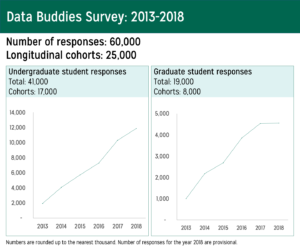Data Buddies Survey Collected 60,000 Responses Over the Past Six Years

The Data Buddies Survey (DBS) began collecting data in 2013 after two years of piloting. The project was initiated by CRA-W as part of a National Science Foundation grant to collect data from undergraduate and graduate students in computing nationwide to use as a robust comparison group for systematically evaluating CRA-W programs. Since then, the annual survey has grown and been used widely for both research and evaluation. In 2014, CERP added a longitudinal component to its data collection efforts and started recruiting cohorts of students who take the DBS to follow-up with them in an annual basis.
DBS 2018 came to a close at the end of February 2019, concluding its sixth year of data collection. This graphic provides an overview of the amount of data collected over these six years. The survey has collected approximately 60,000 total responses and 25,000 of these respondents agreed to join CERP’s longitudinal cohorts. As the line charts illustrate, the number of respondents increased greatly over time, partially as a result of an increasing number of departments participating in the project.
DBS is a rich data source that provides important information to the community on the state of computing higher education from the students’ perspective. Participating departments gain insights about their students and are able to track their departments’ progress over time through the customized department reports they receive every spring. These customized reports also enable the departments to compare their students to students in other comparable departments in a wide variety of metrics.
Visit https://cra.org/cerp/data-buddies/ to find out more about the Data Buddies project, view sample department reports, and sign-up to become a data buddy.
 This analysis is brought to you by the CRA’s Center for Evaluating the Research Pipeline (CERP). CERP provides social science research and comparative evaluation for the computing community. Subscribe to the CERP newsletter here.
This analysis is brought to you by the CRA’s Center for Evaluating the Research Pipeline (CERP). CERP provides social science research and comparative evaluation for the computing community. Subscribe to the CERP newsletter here.
This material is based upon work supported by the National Science Foundation under grant numbers (CNS-1246649, DUE-1431112, and DUE 1821136). Any opinions, findings, and conclusions or recommendations expressed in this material are those of the author(s) and do not necessarily reflect the views of the National Science Foundation.








